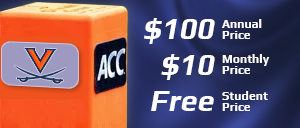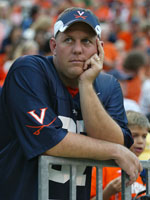 |
|
Dejection was one of many negative feelings experienced by UVa fans in the loss to TCU on Saturday. |
In the Cavaliers’ first road game at Southern Mississippi this weekend, they’ll expect plenty of boos and catcalls. This time, though, at least they will indeed be expecting them.
Virginia’s performance in Scott Stadium its first two games has prompted numerous showings of displeasure from fans, from booing the Cavs into halftime to painting “GROH MUST GO GROH MUST GO GET OUT” on Beta Bridge at UVa (view it on our Twitter page). Whether Virginia will travel to a more hostile environment Saturday is debatable; at Monday’s press conference, though, Virginia coach Al Groh and his players said that what happens outside the locker room is irrelevant.
“I hear complaining [from fans], but they’re always talking about ‘we’ lost,'” right guard Isaac Cain said. “They’re just outsiders like everyone else.”
With a win against Southern Mississippi, Virginia could possibly make up ground with its fans, as the Golden Eagles present a tough opening road match-up. Coach Larry Fedora installed his own version of the spread offense in his first season with Southern Miss last season, and by season’s end it became quite productive. While the Cavaliers made their way out of bowl eligibility in 2008 with four straight losses to end the season, Southern Miss did just the opposite; after opening the season 2-6, the Golden Eagles won their final four games to earn a berth in the New Orleans Bowl, where they defeated Troy 30-27. In their final five wins – all of them against Conference USA opponents – they managed 32 points per game, including a 70-point outbreak in the first win of their streak against UAB.
And, while UVa’s skid has extended to six consecutive losses dating back to last season, Southern Miss has now pushed its win streak to seven wins with a 2-0 record to start 2009; the two home wins came against Alcorn State 52-0 and UCF 26-19. Groh noted that, in watching film of the Golden Eagles from the beginning of last season to now, the difference is quite apparent, and is obviously one that Virginia hopes to mirror as the 2009 campaign continues.
“Coach Fedora went in there, put in a new system in all three phases – we can kind of relate to him a little bit, dealing with that in two out of three phases,” Groh said. “As the season went on, in actually watching their season in different time-frames – what it looked like early, in the middle, in the end, and now this year – you can clearly see just increased execution in all the different schemes.”
A Common Thread
Following Virginia’s loss to William & Mary, Groh was asked what previous teams that had faltered early – specifically the 2002, 2007 and 2008 squads – had done to turn their respective seasons around. Groh’s general response was that the players stuck together, and were able to tune out the negativity from the outside. On Monday, Groh was again asked this question, but this time in the context of what the coaching staffs did in those situations. And this time, Groh’s answer had a somewhat different flavor.
“One was a great determination on the part of the players to make things better, a willingness to continue to grind and work, and a belief in the system that allowed them to maintain their confidence, that, one, what we were doing and how we were doing would work out,” Groh said. “And then along the way in each particular case, there’s been some circumstances where strategically and tactically we might have said, look, we’re gonna reshape things a little bit here at this particular time.
“There’s been elements of all of those – certainly not the same percentage to each particular circumstance – but elements of all of those in each [previous season].”
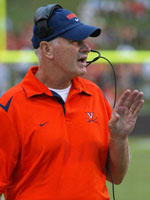 |
|
Virginia coach Al Groh has used some creative motivational strategies to bring teams out of a slump in his coaching career. |
The coach was also asked about specific motivational strategies he had used previously in his career. His most famous example is bringing a shovel to the sideline, which he did as an assistant with the New England Patriots under Bill Parcells in the 1994 season. After starting the season 3-6, the shovel was meant to symbolize his players digging themselves out of a hole; the Pats would not lose another regular season game as the shovel remained on the sideline for the rest of the season, and made the playoffs for their first time with Parcells at the helm.
Other examples include passing out flashlights to the players, which Groh did as the head coach of the Jets in 2000. The gesture was in mockery of the previously traded Keyshawn Johnson, who called himself a “star” in comparison to Jets receiver Wayne Chrebet, who was just a “flashlight.” Going back further, as the head coach for Wake Forest in 1984, Groh ate a worm after referencing an Alaskan ice fisherman who kept worms in his lower lip in order to keep them warm and catch the best fish. On both those occasions, his teams pulled of an upset in the next game.
“With the combination of administrative duties, practice scheduling, whatever involvement in the schemes and the X’s and O’s that the head coach has, sometimes it’s difficult just to say, ‘Slow down, think about the team, think about certain players on the team – what do they need to hear?'” Groh said. “If it’s always about a gimmick, then it just it’s like Vaudeville – what’s the next show gonna be, what’s the next act gonna be? I think it has to take a special occasion for it, and sometimes they really work out well.
“I might go to something. I might put the worm third though.”
Evaluating Sewell
Jameel Sewell ‘s numbers against TCU – like pretty much every other offensive player – weren’t exactly dazzling. He completed 8 of 18 passes for 120 yards, with two touchdowns and one interception. Nevertheless, with Vic Hall injured, Groh said that he is leaning toward having Jameel Sewell be the full-time guy.
The two touchdowns that Sewell did throw, of course, were meaningless additions to the final score late in the fourth quarter, and accounted for 82 of Sewell’s 120 passing yards. Nevertheless, Virginia at least has something positive to build from after those two TDs, Groh said. And, he also was pleased with how Sewell looked compared to a week ago.
“I said to Jameel last Thursday evening at dinner, particularly about his practice on Thursday, – about his overall week altogether, but I said to him that particular day – ‘I thought you had a very strong presence today, and threw the ball with conviction; this is where I’m gonna go with the ball, and I think there is gonna be a good end result,'” Groh said. “That doesn’t mean that every play necessarily turned out perfectly in the game, but those plays that he was involved in during the course of the game, he had a very good presence about him throughout the game, and everything he executed, whether it was run or pass, he did it with a strong conviction.”
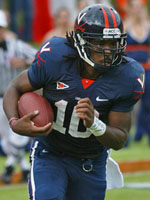 |
|
Jameel Sewell is now the leading candidate to be Virginia’s full-time quarterback. |
On a related note, Groh was also asked repeatedly about the inability of Virginia to throw downfield against TCU. Groh said after the game that the inability of the offensive line to protect Sewell had a lot to do with the lack of downfield passing; however, he also said that the priority of controlling time of possession against TCU played an important role, and that a different opponent might involve more passes downfield. As an example, Groh said that against William & Mary the game plan was to throw three vertical passes in the first 15 plays.
Time of possession “clearly is a factor in [TCU’s] success, so right away, when we see that, and when we see how they put it together, we said, ‘One of the components of beating the team is you’ve gotta get their time of possession down,'” Groh said. “One of the ways to do that is to maximize the amount of time that goes off the clock while you have it.”
And, like Saturday, Groh remained convinced that, if it had not been for the unsportsmanlike penalty on Corey Mosley that kept the Frogs’ first touchdown drive going, Virginia had a good shot of having the Frogs shut out at the half and owning a large margin in time of possession, in accordance with the game plan.
“Had we had a large number of incompletions – based on, that’s usually the case with a lot of vertical passes – in that particular game, and they would’ve had the ball for 19 minutes in the first half, then perhaps we wouldn’t have been able to run the kind of game that we wanted to,” Groh said. “Had we not gotten some outside interference in that [from the penalty], we were putting the game together the way that we wanted to, and our players were gonna be able to go in at halftime against the No. 7 team in the country last year, and say, ‘Hey, we got these guys pretty good, we’ve got a real chance here.'”
Then, in the second half, when Virginia began to pass more and use up less clock, Groh said that led to TCU blowing the game open.
“You can clearly see the time of possession flip dramatically in the second half, and part of that had to do with the increased volume of incomplete passes,” Groh said. “That also resulted in more plays for their team, greater time of possession, and the result that we got.”
The Defense That Was, And That Could Have Been
Not everyone had a bad game against TCU, and Groh was quick to point out who deserved accolades, particularly on the defensive side. In general, like the opener against William & Mary, Groh said he was fairly pleased with how the defense performed given the futility of the Virginia offense. In particular, UVa has excelled in its nickel and dime packages, holding TCU and William & Mary the week before to a combined 9 of 31 on third down conversions.
“We could be doing better on defense, but [we’re] doing a pretty decent job,” Groh said Sunday during his teleconference. “The third down plays are a fairly decent indicator of the kind of work that some of them are giving us.”
As for the individual players, one name Groh brought up was Matt Conrath , who was selected by the coaching staff as UVa’s Defensive Player of the Week. Conrath was credited with eight tackles – two of them for a loss – and a sack.
“I told him, ‘I don’t care who that guy [on TCU] plays against this year, or where they come from, he’s not gonna have any nights any more difficult than the one you gave him,” Groh said. “He’s got a lot of games left to play, and clearly at the pace that he’s moving, [he’s got] a very, very good upside.
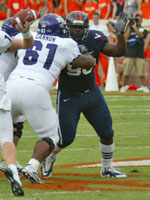 |
|
Defensive end Nate Collins had five tackles and a sack against TCU. |
Groh also lauded the play of Nate Collins at the other end, saying that the end position “is a position that seems to suit him well.” He added that Collins might have played on the end rather than on the nose his freshman season if it had not been for the depth of Chris Long , Jeffrey Fitzgerald , and Sean Gottschalk at defensive end in Collins’ freshman season.
Safety Rodney McLeod also impressed Groh with his play Saturday – McLeod finished with seven tackles and a tackle for a loss, showing off his speed in pursuit of both the ball and the ball carrier on many occasions.
“It’s very impressive the way he’s taken to the [safety] position,” Groh said. “He sees the game well, and it really adds up to him. Not only is he looking at it, he knows what he’s looking at. It makes sense, and he’s got a real good feel for where the ball’s going.”
Puzzling Punt Returns
On message boards and elsewhere, there has been a great deal of confusion on Groh’s philosophy on where he wants his punt returner to position himself and catch the ball on punts that flirt with the Virginia goal line. Chase Minnifield added to that confusion with his returns Saturday. First, he stood on the five-yard line, and he made a fair catch on a punt at the three; then, on the next TCU punt, he started on the 10-yard line, but let the ball drop in just inside the 10, and the Frogs downed the ball at the three.
Groh cleared up some of this confusion in his last two conferences. Sunday, he said that, in both cases, he would have preferred that Minnifield do just the opposite of what he did; he would have liked for Minnifield to let the punt go that landed at the three yard-line, but catch the one that landed between the five and the 10. The starting position of the returner, he said, is irrelevant – the important factor is where the returner is comfortable standing in order to catch the ball no farther back than the 10-yard line.
“We don’t want the ball caught inside the 10-yard line,” Groh said. “The issue is not where the player lines up, the issue is the decision that the player makes to catch the ball. Whether you line up at the 10 and move backwards or line up at the five and move forward, it’s just an issue of where the ball is coming down.”
Worth Noting
- Groh has repeatedly referred to “physical circumstances” that have inhibited right guard B.J. Cabbell from playing as much recently and that may continue to hamper him moving forward. Walk-on Isaac Cain made his first start in Cabbell’s place Saturday, and Groh said that redshirt freshman Aaron Van Kuiken (6’7″, 305 pounds) is next in line behind Cain.
- Riko Smalls has moved from wide receiver back to his original position of quarterback. Groh said that he made the move because he wanted to have a third-string quarterback ready with Vic Hall unable to play Saturday due to a hip injury.
- Saturday will mark the first time that Virginia has played Southern Mississippi in football, and is in fact its first trip to the state of Mississippi.
- This is just Virginia’s third game against a Conference-USA opponent. The other two games both came against East Carolina, losing at ECU in 2006 and winning at home in 2008.
- Like the deal the Cavs had with ECU, Southern Miss will make the trip to Charlottesville in 2011.
- The last time Virginia won its opening road contest was in 2005, a 27-24 victory at Syracuse. In 2008, the Cavs were 1-4 on the road.
- Virginia has played at least one non-conference road game the last 12 seasons. Since Groh arrived in 2001, Virginia is 3-8 in these games.
- Fedora came to Southern Miss after serving as the offensive coordinator for Oklahoma State for three seasons. In his final two seasons, Fedora’s offense averaged more than 30 points per game.
Worth Quoting
“It’s different from last year where we had more people in to block. It’s challenging in the fact that, a lot of times you end up singled up on a guy, whereas before, we were able to slide more and help each other out with that. But, I think that with our experienced group of O-Linemen, we should be able to handle that kind of thing.”- Left guard Austin Pasztor on having less bail-out options in pass protection with tight ends and backs often unavailable for that role in the new offense.
“Once those issues came up, when you call the game, that clearly has to be taken into account. That made it pretty difficult in a situation where, now we’re looking to play catch-up, that made it pretty difficult from a play selection standpoint.” – Groh on the consequences of the offensive line’s inability to pass protect against TCU.
“He’s fun. Every day out there in practice, he’s lively, he’s energetic, he’s a very positive kid. He expects to do well at whatever he does. He’s kind of one of those real light bulbs that really lights things up wherever he goes. He has a high expectation of success, and does every day in practice that way – did a nice job on special teams, and more than likely his primary role this year will be on special teams. We can certainly see the possibilities where that role might expand.” – Groh on Perry Jones .
“There haven’t been very many balls up the field on him. We mentioned last week that I think we had 24 passes thrown five yards or less from the line of scrimmage, and that’s why teams do it – you safeguard the ball. It’s gonna be difficult for any guy to get a lot of picks on that circumstance. But, there have been some plays up the field that I’m sure he’d like to change. We’re working with him to try to do that.” – Groh on cornerback Ras-I Dowling making few plays on the ball and overall not playing his best in the first two games.
“We had made an arrangement with the MAC conference. With the situation they had there when Temple was going into the MAC, in order to get Temple up and going with a full schedule as quickly as possible, they were gonna try and have to move some games, and I think they tried to broker some games with some conferences – they called the ACC. One of the games they were brokering was that if you have any team that’s willing to go to Middle Tennessee for one game on the road, that we’ll promise you three MAC opponents of your choosing at home. And, this was the time that the 12th game was being created, and so we were trying to line up 12th games at that particular point, then all of the sudden here was the opportunity. It seemed that it would work out pretty well – the games were gonna be at home, at which time we were trying to move up to seven home scheduled games, and these were all with Division I opponents – it seemed to work out perfectly. The imperfect part of it was that the MAC failed to live up to the agreement. Therefore, we were forced to on short notice schedule a number of games.” – Groh on how the series with Southern Mississippi started.



